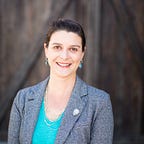From hope to action in an age of climate change
Tessa Hill is an oceanographer and climate scientist at UC Davis, and is also a AAAS Leshner Fellow in Public Engagement
This week I gave two presentations on ocean acidification at the Romberg Tiburon Center for Environmental Studies, north of San Francisco. While one presentation was for a scientific audience and the other for the local community, many of the themes were the same. How can we stand up for science and evidence-informed decision making during this time? How can we make progress on challenges such as climate change and ocean health? In this post I summarize some of the main messages that came through during the presentations and discussions.
Federal support of science in our country translates to innovation, US competitiveness, jobs, and impacts to our economy. We want the US to be a leader in research, technology, discovery, and problem solving. Federal support — meaning strong federal science agencies and funding of research across the country — is critical to this vision. Stand up for agencies that maintain our scientific leadership, by calling your Members of Congress.
Reach out and build common ground. I got some great questions about how to talk with family members and friends about climate change. There are wonderful resources online to help start these discussions (e.g., here, here, and here), but in general my advice was: let’s start these conversations based upon shared values and visions for the future. What do we love most and want to protect? Our children, our communities, local jobs, being thoughtful stewards of our planet? Climate change is fundamentally an issue that will impact people and things that we cherish. Let’s start the conversations there.
Take action locally, and globally too. We all make decisions every day — how we drive to work, what food we buy at the store, what products we purchase — that impact the fate of carbon emissions and the health of our ocean. Consider your daily actions. Then, reach out to a group that is working locally to build in climate resilience and reduce local carbon emissions (there are lots of these, but here is one example). Finally, whether you are in a ‘red’ or a ‘blue’ state, please call your Members of Congress and make sure they are representing you on issues related to climate change, ocean conservation, and federal funding of science, and while you are at it, call your State Legislative representatives, too.
Support bipartisan efforts to tackle climate change. In particular, I recommend the Climate Solutions Caucus, a growing list of Republicans and Democrats that are working together towards economic incentives that will move the needle on carbon emissions. We can support the CSC by getting involved in the Citizens Climate Lobby and also calling our own representatives and asking them to join the group.
Stay inspired. During my talks, I highlighted and recommended excellent science communication efforts by Priya Shukla, Kristin Aquilino, Erin Satterthwaite, Kristy Kroeker, and Katherine Hayhoe. These folks inspire me and I think they will inspire you too.
To face the challenges confronting us, we’ll need a deep reservoir of hope, a plan for the future, and some resilience to setbacks. Please join me in this work!
I am grateful to the students, staff and faculty at SFSU Romberg Tiburon Center for an inspiring day of discussions.
